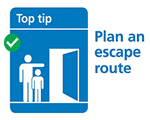 Go to main content
Go to main content
Archive Website of the UK government
Please note that this website has a UK government accesskeys system.
Main menu
Page menu
Home and community

Planning a safe escape

Preparing and practising a plan of action will help you act quickly if there’s a fire in your home – it could even save your life. Find out how to make an escape plan, including tips on making a bedtime fire safety check.
Make an escape plan
When you make an escape plan, involve everyone who lives in your home, including children, older or disabled people and any lodgers.
Choosing an escape route
Here are some tips to help plan your escape from fire:
- the best escape route is often the normal way in and out of your home
- think of any difficulties you may have getting out, eg at night you may need to have a torch to light your way
- choose a second escape route, in case the first one is blocked
- keep all exits clear of obstructions, like bicycles
- if there are children, older or disabled people or pets, plan how you will get them out
Think about a safe place to go if you can’t escape
The first priority is to keep people safe by getting them out of the building. If you can't escape, you’ll need to find a room to take refuge in. This is especially important if you have difficulty moving around or going downstairs on your own.
If you can’t get out, get everyone into one room:
- choose a room with a window
- if you can put cushions, towels or bedding at the bottom of the door to block smoke
- open the window and call for help
- think about which room might be best for this – you need a window that can be opened and, if possible, a phone for calling 999
Make sure everyone knows where door and window keys are kept
Decide where the keys to doors and windows should be kept and always keep them there. Make sure everyone in your household knows where they are.
Explain the plan
Once you have made your plan, go through it with everyone in the household.
You could also:
- put a reminder of what to do in a fire somewhere where it will be seen regularly, like on the fridge door
- put your address by the phone so that children can read it out to the emergency services
See ‘Fire safety advice for parents and child carers’ for more information about talking to your children about fire safety.
Practise the plan
Make sure you have ‘walked through’ the plan with everyone in your household. Regularly remind everyone of what to do, and what not to do, in the event of a fire.
See ‘What to do if there is a fire’ for more information about escaping from a fire.
Do a bedtime check – develop the habit
When you are asleep, it takes longer to notice the signs of a fire. If you don’t have a working smoke alarm, there will be nothing to wake you.
To help prevent fires occurring through the night, it’s important to check your home for fire hazards before you go to bed. Make sure you:
- check the cooker is turned off
- turn off and unplug electrical appliances (unless they are meant to be left on, like your freezer)
- put candles and cigarettes out properly
- turn heaters off and put up fireguards
- make sure exits are kept clear
- close inside doors at night to stop a fire from spreading
Keep your guests safe from fire
Your family or housemates may be familiar with your house or flat, but your guests may not be. If you have guests staying overnight:
- tell them where the keys are kept
- give them information about anything in the house they may not be familiar with, like how to unlock your front door
It’s particularly important to provide some fire safety information if you are hosting a party and people are drinking alcohol. Also, the risk of fire during celebrations may be higher from candles, cooking and cigarettes.
Escaping from a high-rise building
Living above the first floor doesn't necessarily make you any more at risk from fire. High-rise flats are built to be fire-proof – walls, ceilings and doors will hold back flames and smoke.
Most of your planning should be the same as homes at ground level, but there are some key differences:
- you won’t be able to use the lift if there’s a fire, so choose an escape route that takes this into account
- count how many doors there are on the route to get to the stairs when you can’t use the lift, in case you can’t find your way
- make sure stairways and fire escapes are kept clear of all obstructions and that fire doors are never locked
- regularly check that you can open the doors to stairways or escapes from both sides
If there's a fire elsewhere in the building, you are usually safest in your own flat, unless heat or smoke is affecting you. If you are affected, you should get out, stay out and call 999.
 Facebook
Facebook Twitter
Twitter StumbleUpon
StumbleUpon Delicious
Delicious Reddit
Reddit
